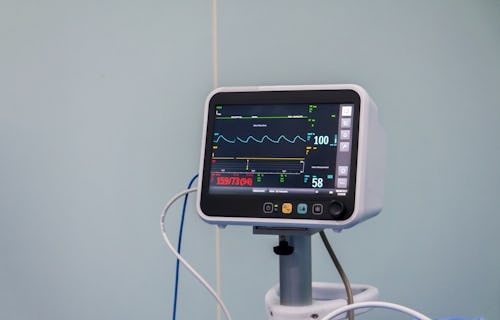Health
A Study Says “Broken Heart Syndrome” Diagnoses Are On The Rise During The Pandemic
The condition is triggered by extreme emotional distress.

As people undergo intense emotional stress during the pandemic, researchers say it's taking a toll on their heart health. From the anxiety of pandemic-related health concerns and economic struggles, to rage and grief at racist police killings, stress levels have spiked over the past few months. Along with cabin fever, medical experts are noticing a rise in broken heart syndrome during quarantine.
Otherwise known as stress cardiomyopathy or Takotsubo cardiomyopathy, broken heart syndrome can feel like a heart attack. Characterized by sweating, nausea, shortness of breath, heart palpitations, and chest pain, broken heart syndrome doesn't kill your heart cells like a heart attack does. Instead, according to Johns Hopkins Medical, doctors believe that a spike in stress hormones like adrenaline temporarily stuns your heart. Stress cardiomyopathy is rarely fatal, but it's still a big deal — and the pandemic could be making it even more common.
According to a new study published in the journal JAMA Network Open, rates of broken heart syndrome among patients with existing heart conditions increased to 7.8%, compared to the 1.7% of patients diagnosed with stress cardiomyopathy before the pandemic. Researchers compared the number of diagnoses of nearly 2,000 patients before and during COVID. They determined that, in addition to the rise of heart incidents themselves, people's average hospital stays for stress cardiomyopathy were longer than they were pre-pandemic. Rates of fatalities from broken heart syndrome, however, have not increased during COVID, and none of the subjects tested positive for COVID-19 themselves.
With medication, most people can recover from stress cardiomyopathy, but preventing this damage to your heart during COVID can be challenging. According to The American College of Cardiology, financial stress, physical trauma, violence, grief, and other forms of extreme emotional duress can trigger stress cardiomyopathy. While there are many stressful life events that individuals can't necessarily control, especially during a pandemic, managing your mental health can help prevent heart damage, according to the American Heart Association. If you have underlying conditions like previous heart health issues or diabetes, being vigilant about your emotional well-being might keep your cardiovascular system from getting overwhelmed. Consulting both mental health professionals and a cardiologist, as well as crafting a comprehensive, sustainable self-care plan, can help you get through the pandemic in good heart health.
Studies Referenced:
Jabri, A. (2020) Incidence of Stress Cardiomyopathy During the Coronavirus Disease 2019 Pandemic. JAMA Network Open, https://jamanetwork.com/journals/jamanetworkopen/fullarticle/2768093.